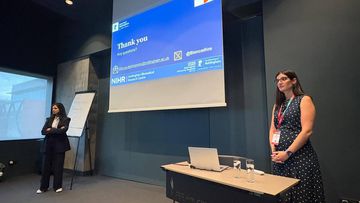Social determinants of health – workstream update
The social determinants of health (SDoH) are life-enhancing resources (fig 1):

Their distribution across populations effectively determines length and quality of life. It is critical that we address these elements if we are to ‘raise the bar’ for everyone with MS, irrespective of their background, circumstances, education or income.
Our starting point is to gather the information we need from pilot sites and submit it for publication, sharing it as widely as possible.
We are asking every participating site to report on:
|
The report will be produced in March 2020, and participation will take just a few minutes.
If you would like to participate, please get in touch to let us know, or simply complete the SDoH Google questionnaire when it is circulated in the new year.
(The SDoH report will be published and all participants will be cited as authors.)
An update on our workstream

by Saúl Reyes, SDoH workstream membe and speaker for the MS Academy
Our Social Determinants of Health (SDoH) workstream was held in July 2019 in Birmingham, and we had delegates from all over the UK. We are grateful to all our colleagues who attended and shared their perspectives on the challenges and opportunities that we collectively face to minimise the impact of social circumstances on MS outcomes.
The distribution of SDoH across populations may determine length and quality of life among our patients with MS. Therefore, evidence based strategies that aim to address SDoH, and which are low cost and realistic to implement, are urgently needed. We have many plans for our SDoH workstream going forward and it is about time to update you all!
In the upcoming months we will be conducting an audit exploring the SDoH among our patients with MS. The aim of the audit is to address the other often-ignored factors in society that drive inequality in health outcomes and to promote a ‘no patient left behind’ philosophy. We would be pleased if everyone (not just the workstream attendees) joins us! For each participating site we would be asking whether they have a comprehensive register of their patients, an estimate of prevalence for their population; whether they have access to some surrogates for the socioeconomic status of their patients; whether they are screening their patients for some key SDoH; and last but not least, whether their patients have access to social prescribing. The audit will help us to estimate how many patients have dropped out of the MS specialist system, and will also help us to support the development and implementation of interventions that aim to ‘Raise the Bar’ for everyone. We will submit the work for publication (all participants will be authors) and the results will be presented in the ‘MS Service Provision in the UK’ follow-up meeting in 2020.
We will be also running a prescribing behaviours / social prescribing case studies webinar in February-March 2020. The purpose is to bring together volunteers from different MS centres to present cases from their practice, where socioeconomic status might have had an impact on prescribing decisions. We would also discuss local social prescribing cultures (if any), and explore the possibility of replicate some social prescribing initiatives among the different centres. The delivery of MS care across the NHS of the UK is heterogeneous and inequities will likely increase in the future. We therefore need to put forward most of our MS centres to actively participate in improving MS services for all, especially for the most vulnerable and excluded. Those who are interested in being involved are welcome to contact us!
Many questions remain to be explored in our understanding of how SDoH may lead to either positive or negative consequences for patients with MS. We are therefore looking forward with excitement to collaborate with you all and be more proactive in addressing SDoH.
Related articles
Encouraging excellence, developing leaders, inspiring change
MS Academy was established in 2016 and in that time has accomplished a huge amount with exciting feedback demonstrating delegates feel inspired and energised along their personal and service development journeys. The various different levels of specialist MS training we offer are dedicated to case-based learning and practical application of cutting edge research.


